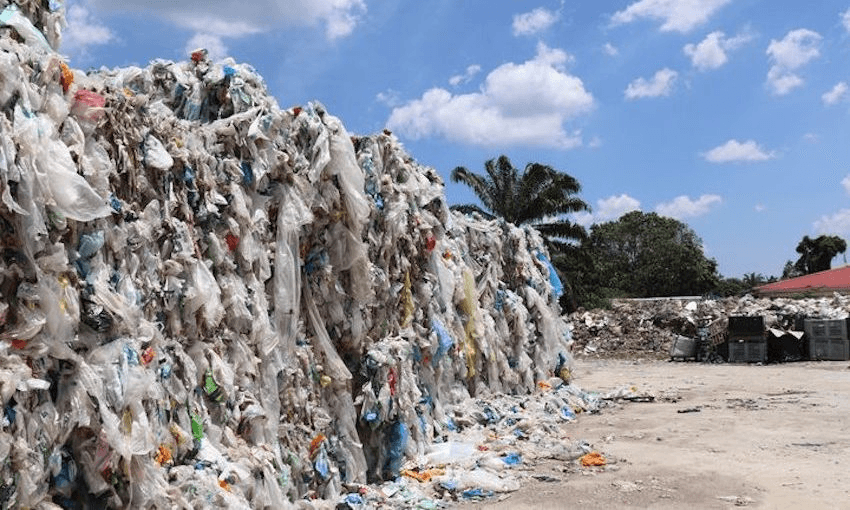Think you’re helping the planet by chucking that sushi container in the recycling bin or dutifully using your local cafe’s compostable takeaway coffee cups? Think again, writes Greg Roughan for RNZ.
So the Sustainable Business Network (SBN) puts out a 47-page report on New Zealand’s plastic packaging system, and there’s a line that leaps out: recycling won’t fix the plastic crisis.
Geez. No kidding.
This is old news. At least, to the sort of person who reads 47-page reports on plastic. And it should be old news to the rest of us too. I really don’t mean to bag the SBN’s report here. Not even reusable bag it, because it’s excellent. But what I do want to say is, maybe if people are surprised about the whole ‘recycling doesn’t actually help much’ thing, then maybe it’s time for some hard truths?
So let’s have at it. Here are three uncomfortable facts about plastic and recycling (plus some useful ideas to make you feel better).
Recycling is mostly PR
So get this. The average old mobile phone has quite a bit of gold in it. You need just 41 phones to get a gram of the stuff – compared to the tonne of ore you’d normally need to process. Yet if you paid people minimum wage to dismantle phones and extract the precious metals there would be no way you’d ever break even (unless the price of gold quadruples – then we’re in business, pal).
The point here is that if we can’t even recycle gold profitably, think about the business case for turning your putrid yoghurt containers into something useful. Frankly, the scale and automation required beggars belief, which is why a) it was all getting taken by China, who b) just burned it sometimes anyway, and then c) got so sick of dealing with your unrinsed milk bottles they have now banned the importing of most plastic recycling entirely.
That’s right. The global market for recycling has shut down. Because it was awful.
Biodegradable plastics are useless
You know that nice, opaque-looking plant-based plastic lid on your compostable eco-friendly coffee cup?
It’s not compostable. Not in any normal sense of the word.
They’re made from polylactic acid (PLA), which only breaks down above 60ºC. I know this because I once put a PLA lid in a worm farm for a year, then dug it out again. Despite the best efforts of 1000 tiger worms – and about a billion microbes – it emerged remarkably unmolested.
And look, there are companies like Innocent Packaging running full-circle composting collections for PLA, which sees it successfully broken down in hotter commercial facilities, but on the whole biodegradable plastics simply cannot be recycled. Instead, they belong in landfill, where they’ll keep your old toothbrush and your plastic bin liners company for a long, looooong time.
Recycling numbers aren’t recycling numbers
HDPE, PET, PVC, EPS… all those acronyms stamped on the bottom of your plastic containers, with a number from 1-7, all surrounded by that little triangular set of arrows that tells you it’s recyclable…
Yeah, sorry. That symbol is just the Resin Identification Code, which – especially now that China won’t take numbers 3-7 – by-and-large tells you what kind of plastic it is that you can’t recycle.
Ah, heck, let’s not be too cynical. There are actually outfits in New Zealand that will grind up type one plastic (PET) for local reuse. But as for the rest of it… don’t hold your breath.
So what should we do?
All right, that was depressing, so what about some positive ideas?
Well firstly, let’s take a breath and appreciate that our number-one earning industry, tourism, is almost entirely supported by the concept of New Zealand being unpolluted. As is much of the value-added part of the primary sector, for that matter.
That’s a pretty good case for investing in plastic pollution solutions, if you ask me – and if you really want to ring-fence that money, just go ahead and slap an eco-fee on every tourist who comes here. They should feel lucky to pay it. Then put the money towards a couple of decent ideas:
- A government-supported product stewardship system that rewards companies that meet or exceed sensible packaging rules. And yes, creates a headwind for those who don’t play ball. Because if New Zealand can beat the world to universal suffrage in the 19th century, surely we can prevent the sale of individually wrapped prunes in the 21st?
- A compostables pick-up for all city households, so we can reduce the volume of waste going to landfill by diverting it to commercial composting facilities (along with all those stupid compostable cups).
- An outright ban on single-use plastics. Because lollipop sticks made from cardboard were actually fine, and the fact that cigarette butts are made of plastic is frankly insane.
Greg Roughan is the former editor of Green Ideas magazine.

